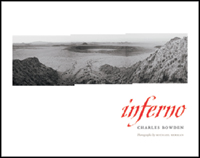A study of desert, internal and external.  "inferno"
"inferno"
by Charles Bowden
photographs by Michael P. Berman
University of Texas Press, 2006
$45
"Supposing truth to be a woman – " Nietzsche wrote at the beginning of "Beyond Good and Evil," "what did philosophers, at least the dogmatic ones, know about women? Weren't the ghastly seriousness and the awkward thrusting with which they have always approached truth unimaginative and unseemly tools to win, of all things, a woman?"
"inferno," Charles Bowden's new book (with striking black-and-white photos by Michael Berman and an exquisite design that values print as it does image) knows all about truth being a woman. The book's sometimes hallucinatory, often contradictory, and always white-hot prose is a supple and sensuous organ of seduction.
The woman in question is a patch of Arizona desert, and this woman, too, has had relations with William Jefferson Clinton, who, as one of his last acts as President, in response to lobbying by Bowden and others, established the Sonoran Desert National Monument.
So Bowden now sits "on the ground of a great desert. . . . I've come here because this place has always worked for me and has forced me to surrender the buzz of my ideas and taste the limits of my power."
In the hours before dawn, sipping a cup of espresso made on a little camp stove, Bowden chases thoughts and memories with the exquisitely bitter coffee and his fierce, rampant desire to live outside his mind:
I should have been a dog… the eyes bold, the manner cunning, running up the wash, running for miles, slipping under the barbed wire, dodging the mesquite, the cholla, the prickly pear, snorting down the books written in the air, eyes cocked for danger, nose alive to the noise of scent, the muscles toned and pulsing, lungs gulping air, feet hard and taking the rocks with ease, a blur moving through the tall grass…"
He thinks/tastes/smells his way inside badgers and owls, hummingbirds and bighorn sheep, back into dogs: "into that miasma, the same one within me, the place inside the cells, the place hidden inside the word Mind, the thing flowing through the nostrils of a dog sucking in the literature of a wet spot and reading millions of years of life in a flash."
Wine and sex and drugs and the tiny cup of hot espresso keep Bowden's mind at bay, keep him focused on the woman who is the desert: "I think that is why I hate nature writing…. Hate it because it seeks a throb, a big moment, a chamber of time full of meaning and narrative and song and story and fails to know the scraping of the shoes on the bumpy ground…because all it is or ever can be is what flows into my eyes and nostrils and across the blank sheet of the place where my mind once festered."
"I also worry," he writes, "that people with a deep interest in the natural world seem to lack a deep interest in burlesque, makeup, high heels and the Kamasutra. . . ."
And here the crux of Bowden's approach to the desert, to the woman: appetite. The appetite to possess is killing the world (seen in an amazing, contradictory portrait of a Mexican truck driver preparing lines of cocaine and a 12-pack of Tecate beer for a quick 1,000-mile haul of consumer goods). Yet only appetite, animal appetite, is the truth of the desert (and in the Mexican's appetites Bowden finds his own). "What if," he asks, "when we get out here on the hot ground in the August night, we discover that this is the way it should be but cannot be for our kind. And that is the very reason we must preserve it-not for beauty, biology or God and country, but so that we can always know the place we dream of being, the place we cannot belong. The place for our yearning."
"You want to live 'according to nature'?" Nietzsche asks in "Beyond Good and Evil." "You noble Stoics, what a fraudulent use of words! Consider a being like nature, profligate beyond counting, absolutely indifferent, aimless, merciless, without pity and justice, simultaneously fecund and desolate and uncertain, consider indifference itself as power- how could you live according to this indifference? Living-isn't that simply the desire to be other than this nature? … Your pride wants to force your morals, your ideas onto nature; you demand that nature be 'nature according to the Stoics. . . .'"
Bowden's nature (and yes, he's aware that it is "his nature") is anything but.
Scott Abbott is director of integrated studies at Utah Valley State College.
